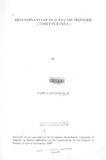| dc.contributor.author | Audi, Pamela A | |
| dc.date.accessioned | 2013-05-03T11:33:00Z | |
| dc.date.available | 2013-05-03T11:33:00Z | |
| dc.date.issued | 2004 | |
| dc.identifier.citation | Masters thesis, University of Nairobi (2004) | en |
| dc.identifier.uri | http://erepository.uonbi.ac.ke:8080/xmlui/handle/123456789/18665 | |
| dc.description | Research project presented to the Economics Department, University of
Nairobi, in partial fulfillment of the requirements for the Degree of
Masters of Arts in Economics | en |
| dc.description.abstract | Despite the governments' efforts to enhance good health through provision of highly
subsidized or free medical care, patients have continued to respond to illnesses in diverse
modalities. In Kenya, a large percentage of ill individuals continue to rely on lay care
despite the strategies. The practice is obviously dangerous for the general population
health considering that some sickness may turn out to be different from what the sick
think, when diagnosed by qualified medical personnel.
In this study, the determinants of health care provider choice in Kenya have been
explored using data from "The Kenya National Health Accounts, Household Expenditure
and Utilization Survey, 2003" which was conducted by Ministry of Health. The
estimations are based on nested multinomial legit model.
Individuals, households and provider characteristics have been used in the analysis with
most of the variables having expected signs. Age of individual/household head and
household size have a significant negative effect on the choice of provider. Similarly,
monetary and non-monetary costs (total treatment time and distance to the health facility)
have also been found to significantly influence the demand for health care negatively.
Socio-economic status, education level and having a health insurance all have positive
and significant effect on the choice of provider.
III individuals are more responsive to changes in total treatment time than changes in cost
of treatment at the public facilities. This indicates that quality (total treatment time as a
quality measure) is more of a deterrent factor in choosing a public provider than the cost
of treatment. | en |
| dc.language.iso | en | en |
| dc.publisher | University of Nairobi | en |
| dc.title | Determinants of health care provider choice in Kenya | en |
| dc.type | Thesis | en |
| local.publisher | Department of of Economics | en |

